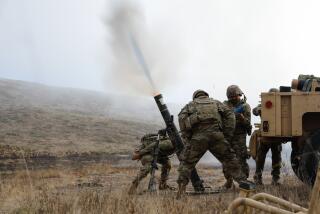Loss Reinforces Oceanside’s Ties With Marines : Changing times: Once embarrassed by its identity as a military town, the community is rediscovering its link with Camp Pendleton’s Marines.
- Share via
For years, Oceanside has fought its reputation as a raunchy garrison town where young Marines from neighboring Camp Pendleton busted up bars and kept hookers in easy federal money.
There was truth behind that image during the Vietnam War era, when Marines, many of them reluctant draftees, lingered in the downtown, adrift in drugs and booze, confused by the detested war.
But now, with a new generation of 20,000 to 30,000 local Marines shipped off to the Middle East, Oceanside is left with an irony.
For all its civic desire to downplay the Marines and tout itself as a shimmering coastal mecca for tourism and investment, the city is rediscovering the economic and spiritual bonds that have connected it to the military since the base opened in 1942.
Even though an influx of urban refugees from Los Angeles and Orange counties has helped swell the population to nearly 130,000, Oceanside remains a fundamentally conservative, pro-military community that cares about its Marines.
Especially now, during the sentimental holidays.
“I’ve been receiving an outpouring of comfort and love within the last month,” said Linda Rodarte, the wife of a staff sergeant deployed to the gulf.
The native of Leitchfield, Ky., population 18,000, is used to an effusion of small-town patriotism and support when the boys have left for war. Rodarte was surprised by the reaction in Oceanside when people spotted the yellow ribbon fluttering from her car.
“Even driving on the road, somebody would put thumbs up,” she said. “When I pulled into the mini market, people grinned. I’d expect that in my hometown, but I didn’t expect it in Oceanside.”
Certainly there have been no parades down Hill Street, or any outburst of Splendid Little War jingoism a la 1898, but in poignant ways civilians have rallied to the Marines and the families left behind.
City Councilwoman Melba Bishop, whose husband, Lucky, was a career Marine who served four tours in Vietnam, observed that the military-civilian relationship links the whole community.
“There’s nobody in this town who doesn’t have some dealing with a Marine family,” said Bishop. “It’s a military community pulling together better than it’s ever done.”
Emotions are running so high that when the Armed Forces YMCA put on its annual program to place Marines with local families for Christmas, there weren’t enough young Marines to go around.
YMCA Executive Director Glen Bryson said that last year, 200 families invited Marines for Yule dinner, a number that doubled this time around.
Bryson said, “We had to stop taking phone calls from families wanting to take Marines home for Christmas because we didn’t have enough Marines.”
Many of the families had never invited servicemen into their homes before, but somehow the tense Middle East situation inspired them to extend their hospitality.
Lee Schwabe, a bank loan agent who moved from Anaheim to Oceanside 1 1/2 years ago, trekked down to the YMCA on Christmas Day to pick up two young lance corporals from the South who had only been in Oceanside a week.
“We would have asked for three of them, but we’re satisfied with the two,” said Schwabe, who has never been in the military, but decided with his wife, Beverly, to do something kind for some Marines.
“As far as the Marines being deployed, it sure seems empty (in Oceanside), and everybody feels it,” said Schwabe, who did not treat the Marines to home cooking as an endorsement of U.S. foreign policy in the gulf, but rather as a humanitarian gesture.
“We just wanted to help somebody out,” he said.
The Schwabe family’s two guests, James McCrary of Peachtree City, Ga., and Eric Brown of Atlanta, whose military jobs are in grave registration--processing the dead--were happy somebody would take them in.
McCrary said that, if it weren’t for the Schwabes, “We’d probably just be back at the barracks, sitting around.”
Oceanside isn’t an ordinary city, not only because it has the world’s largest amphibious training base for a neighbor, but because generations of Marines have remained in the community.
Many former Marines, devoutly believing they are lifelong members of an elite brotherhood, are helping service organizations provide for the 12,000 Marine dependents left at Camp Pendleton and the 32,000 living in the surrounding area.
On base at the Navy Relief Society, director Jinx McCain, a retired Marine colonel and combat veteran of three wars, watches the donations roll in and marvels at how Marines stick together.
Five former Marines have volunteered to help. “You’re a Marine forever,” McCain said.
“We have Marines every day asking us what they can do. We had a retired Marine come in the other day and hand me a $100 bill and say, ‘Here, help somebody with this,’ ” said McCain.
But compassion and patriotism aside, sheer economics is another reason Oceanside misses its Marines.
With a normal complement of 36,000 Marines, Camp Pendleton’s payroll tops $400 million a year. Although there are no figures for how many Marines and family members actually live in Oceanside, most downtown merchants testify to their buying power.
Next to the recession, city officials blame the deployment of the 1st Marine Expeditionary Force and the 5th Marine Expeditionary Brigade with a sales tax revenue slump that threatened a $5.8-million city budget deficit.
The city is trying to avert a deficit by a 12% spending cut among city departments.
But that does not help the downtown--midway through a difficult redevelopment effort--where barbers, restaurants, furniture stores, dry cleaners and night spots are hanging on for an end to the Middle East crisis, which in turn would end their own crises.
“Downtown businesses have been hurt dramatically,” said Sam Williamson Jr., president of the Oceanside Chamber of Commerce.
In past deployments, fresh troops arrived at Camp Pendleton to take the place of departed Marines. This time, said Williamson, “It’s becoming more and more evident we do not have the replacement troops.”
The city will not know until January, when it receives information on local sales tax revenue, how deeply the recession and deployment have hurt business. But, with most of the Marines gone for five months, the anecdotal evidence is strong.
Mick Hill is the bartender at Pure Platinum downtown, where on a normal Saturday night, 200 distinctive shaved heads of young Marines watched topless dancers undulate beneath lavender and pink neon lights.
“Now it’s down at least by half,” said Hill. “You take away 25,000 Marines and it’s boom, like taking the village away from the town.”
Down the street at George’s Gyro Burgers, business is off by one-third to one-half, and manager Chuck Flores uttered the truism of most downtown merchants: “We live and die on the military downtown.”
Volume at the eatery has picked up on weekends as Marines passing through Camp Pendleton for training are allowed off base.
But Flores has wearied of all the consternation over the deployment and its hardships on the Marines.
“I’m getting tired of the whining and crying. They’re getting paid, that’s their job. Hey, all they’re doing is sitting around. Nothing’s happened yet.”
Even crime has changed since thousands of Marines left the area.
Police Chief Bruce Dunne, a 24-year department veteran, said the con artists who used to prey on young Marines are now searching for other marks. Marines, said Dunne, “are kind of a vulnerable victim (to) street robbery and con games.”
The Marine as a crime victim is a strange indication of how far the situation has changed since the Vietnam War days, when Dunne recalls many drafted Marines engaged in vice and drunkenness. For a time, MPs from Camp Pendleton accompanied city police on patrol.
Dunne said it’s too early to tell whether the deployment has affected the crime rate, but so far it appears that “there hasn’t been a benefit in that the Marines have gone.”
One thing that’s more certain, the Police Department--like some businesses that have lost moonlighting Marines as part-time employees--has seen six reserve police officers sent off to the gulf with their Marine units.


